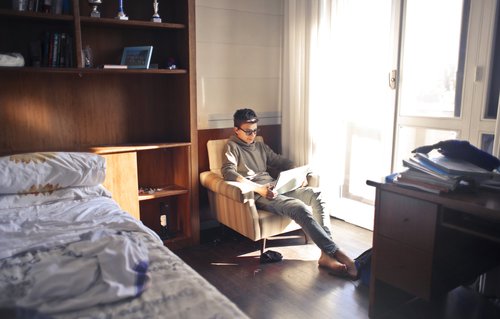17 Smart and Realistic Tips for Your Study Abroad Budget
Posted on April 29, 2016
Studying abroad is pretty expensive, and it doesn’t help to know that a lot of the programs assume that all students have money to burn. If you aspire to make your dream of studying abroad come true, this article is for you. Here are 17 tips to set a realistic budget when studying abroad for the first time
1) Know the Tuition and Choose Your Payment Scheme
Tuition takes the most out of your budget as it’s the major expense if you want to study abroad. Price greatly varies per country, program, and institution. There are payment schemes such as loans and “pay later” options that you may consider to alleviate the brunt of paying the tuition in full or in huge chunks.
2) Be on the Lookout for Miscellaneous School Expenses
Many student budgets don’t include miscellaneous school expenses for things such as books and extra-curricular. In many cases, miscellaneous fees are excluded from the price of tuition. Be on the lookout for miscellaneous fees because they may not be readily apparent. Compute how many miscellaneous fees are required by the program so you can best budget your expenses.
3) Assess How Much Money You Have and Need
While this seems basic, you’d be surprised how many can be clueless about how much money they have and need. Budgeting for your study overseas significantly depends on your financial capacity (unless you have a scholarship or external funding). Ideally, you should already have an accurate assessment of the money you have at least a year before your planned enrollment or application. That way, you have more time to produce the necessary capital needed to finance your study abroad.
4) Cast a Wide Net for Scholarships
Scholarships and other forms of financial aid are the best way to unload the weight of expenses when studying abroad. Take note that scholarships do not all have the same terms. Some cover both tuition and living expenses, including student visa and airfare. Others provide partial assistance only. When planning and budgeting, it’s wise to cast a wide net of applications to as many scholarship-granting institutions. A good place to start is your admissions office and your target university abroad. There are also government scholarships that are generous in funding.
5) Different Countries, Different Costs of Living
The country’s cost of living influences study abroad programs. Have a general picture of how much it costs to live in your destination from various sources, such as the program coordinator and available statistics and country comparisons. Europe has many top schools and competitive programs, but it also has some of the most expensive cities in the world. Generally, Asian countries have a relatively lower cost of living and have a number of excellent educational institutions worth checking out. Bear in mind that the cost of living usually fluctuates, so keep track of changes when doing your budget.
6) Get Health Insurance
Never underestimate the importance of your health as an international student. Budgeting for your health can spell the difference between completing or not completing the program when you fall ill. Things can even be more serious than a bout with flu, so it’s always smart to have health insurance. Most degrees abroad will either provide you with health insurance or require you get one on your own.

7) Save Money by Eating Well
If you have study abroad funding, wisely budgeting your food can also help you save money. When budgeting for food, the rule of thumb is it will turn out cheaper if you prepare your own meals. Avoid relying on ready-made food as this will prove unsustainable in the long run, especially when you’re on a tight budget.
8) Yes, Some Things Are Free
Budgeting for a travel program can make you realize that you get to do many things for free. Outdoor parks, architectural buildings, and the vicinity of your school are good places to consider. Getting a feel of the local life need not be expensive. Walk around town and have the local experience without drying up your funds.
9) Exercise and Mode of Transportation in One
You may have to consider transportation depending on where you will enroll. For study abroad programs, it’s rare that you will have to commute by bus or train, although this can sometimes happen. If it’s a university town, consider allocating a budget for a bicycle, which is an economical mode of transportation. It’s good exercise, too!
10) Ask Your Bank About Wiring Fees
Though you may receive sufficient support from government student loans, there may be times when you’d have to ask for extra money from your parents. Bank fees for wiring and ATM can be expensive when you add them up, so be mindful of this when budgeting.
11) Get Discounts with a Credit Card
Credit cards are convenient, and you can get added value from them if you take advantage of rewards plans. Consider getting one to make many of your transactions more accessible, such as booking a flight for educational college trips with your classmates or paying for your grocery.
12) Consider Your Non-Basic Essentials
Are there non-basic necessities you can’t live without? Count them in your budget. Whether it’s a particular hair product or de-stressing in a local pub, things that can help you have a more comfortable study abroad experience should be considered in your budget. With moderation, of course.

13) To Have or Not to Have a Roomie
For accommodation, you’ll most likely have the option to stay in a dormitory or a student apartment in the school’s vicinity. If you want to have your own room, know that staying in a dormitory usually comes with a roommate. Having your own room in a student apartment is an option, though it can be pricey.
14) Apply for Student Discounts
The abundance of student discounts can make you feel celebratory. From student airfare to museum rates, you can save a lot with special student discounts. Many countries, especially in Europe, have amazing student discount policies, so it’s best to maximize this for great deals. Remember to keep your student ID with you as you will have to present it to get discounts.
15) Set Aside Funds for Extra Expenses
Staying in your college during the summer or holiday break requires you to set a separate budget. Consider things like accommodation if your dormitory closes during a school break. You can also allocate budget for side trips or to purchase new clothes appropriate for the changing seasons.
16) Check Your Budget Often
Alternatively, student loans require you to stick to your budget strictly. To avoid going over-budget, it’s important that you keep track of your expenses. Doing a weekly or bi-monthly budget assessment ensures you’re aware of all your expenses.

17) Value the Experience as Priceless
While budgeting is very important, don’t let it get in the way of you enjoying the overall experience of living your dreams. The whole experience in itself is in many ways priceless. Incorporating the priceless value of studying abroad into your budget means approaching financial discipline as an enabling rather than restricting strategy.
Moreover, there are ways for you to assess just how much you need, and some programs are certainly more budget-friendly than others. Plan ahead and choose a study abroad program that you can comfortably afford.
Author: Trixie Cordova
